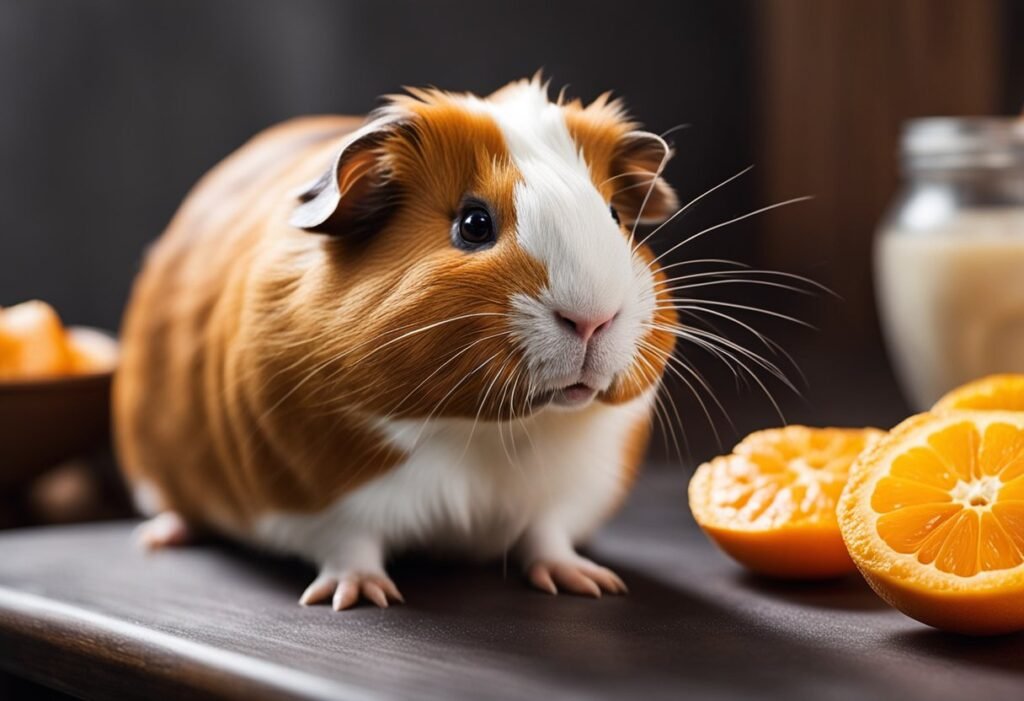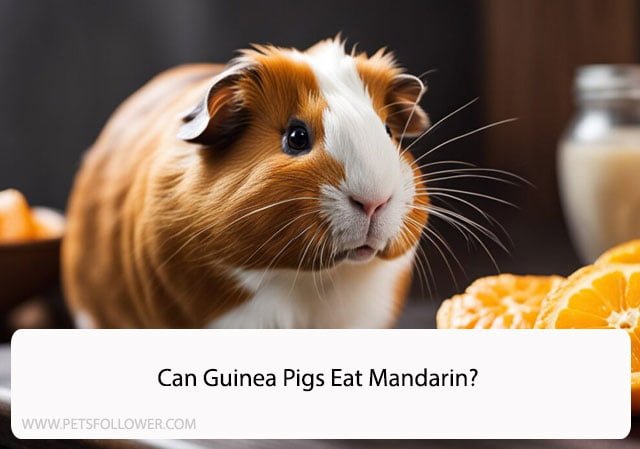Guinea pigs are adorable pets that require a balanced diet to maintain good health. As responsible pet owners, we always want to ensure that our pets are getting the right kind of food. One question that often comes up is whether guinea pigs can eat mandarins.

Mandarins are a popular citrus fruit that is known for its sweet and tangy flavor. While they are a great source of vitamin C and fiber for humans, we need to be careful when feeding them to our pets. In this article, we will explore whether mandarins are safe for guinea pigs to eat and what precautions we need to take to ensure their well-being.
Overview of Guinea Pig Diet

Guinea pigs are herbivores, which means they only eat plant-based foods. They require a diet that is high in fiber, vitamin C, and low in fat. A balanced diet is essential for their overall health and well-being.
The primary source of nutrition for guinea pigs is hay, which should make up the majority of their diet. Timothy hay, orchard grass, and meadow hay are all excellent choices. Hay helps maintain healthy teeth and digestive system.
In addition to hay, guinea pigs also require fresh vegetables and fruits. Some good options include kale, spinach, carrots, bell peppers, and cucumbers. However, it’s important to introduce new foods gradually to avoid upsetting their stomachs.
Guinea pigs also require a source of vitamin C, which they cannot produce on their own. Fresh fruits like oranges, strawberries, and kiwis are excellent sources of vitamin C. Alternatively, vitamin C supplements can be added to their water or food.
It’s important to avoid feeding guinea pigs foods that are high in fat, sugar, or salt. Foods like chocolate, candy, and processed snacks should be avoided altogether.
Overall, a balanced and varied diet is essential for the health and happiness of your guinea pig.
Understanding Mandarins

Mandarins, also known as mandarin oranges, are a type of citrus fruit that are popular for their sweet and juicy flavor. They are a good source of vitamin C and other nutrients, making them a healthy addition to any diet.
When it comes to feeding mandarins to guinea pigs, it’s important to keep in mind that they are high in sugar. While guinea pigs can have small amounts of fruit as a treat, too much sugar can cause digestive issues and other health problems.
It’s best to limit mandarins to a small piece as an occasional treat, rather than making them a regular part of your guinea pig’s diet. When feeding mandarins, be sure to remove any seeds and peel, as these can be difficult for guinea pigs to digest.
Overall, while mandarins can be a tasty treat for guinea pigs in moderation, it’s important to prioritize a balanced diet of hay, fresh vegetables, and a limited amount of fruit.
Can Guinea Pigs Eat Mandarins?

Mandarins are one of the most popular fruits in the world. They are sweet, juicy, and packed with vitamins and minerals. But can guinea pigs eat mandarins? In this section, we will explore whether mandarins are safe for guinea pigs to eat and how they can benefit from this fruit.
First of all, it is important to note that guinea pigs are herbivores and their diet should consist mainly of hay, fresh vegetables, and fruits. While fruits are a great source of vitamins and minerals, they should be given in moderation as they are high in sugar.
Mandarins, like all citrus fruits, are high in vitamin C, which is an essential nutrient for guinea pigs. However, they are also high in sugar and acid, which can cause digestive problems and tooth decay if consumed in excess. Therefore, it is recommended to feed mandarins to guinea pigs in small amounts as an occasional treat.
When feeding mandarins to guinea pigs, it is important to remove the peel and seeds, as they can be difficult to digest and may cause choking. Also, make sure to wash the fruit thoroughly to remove any pesticides or chemicals that may be present.
In conclusion, guinea pigs can eat mandarins, but they should be given in moderation as a treat. Remember to remove the peel and seeds, and wash the fruit before feeding it to your furry friend. By following these guidelines, you can provide your guinea pig with a nutritious and tasty snack.
Health Benefits of Mandarins for Guinea Pigs

Mandarins are a tasty and nutritious fruit that can be a great addition to your guinea pig’s diet. Here are some of the health benefits of mandarins for guinea pigs:
- Vitamin C: Mandarins are a great source of vitamin C, an essential nutrient for guinea pigs. Guinea pigs cannot produce their own vitamin C and need to obtain it from their diet. Mandarins can help ensure that your guinea pig is getting enough vitamin C to stay healthy.
- Antioxidants: Mandarins are rich in antioxidants, which can help protect your guinea pig’s cells from damage caused by free radicals. This can help prevent a variety of health problems, including cancer and heart disease.
- Fiber: Mandarins are a good source of fiber, which can help keep your guinea pig’s digestive system healthy. Fiber can also help prevent obesity and other health problems.
- Hydration: Mandarins are a juicy fruit that can help keep your guinea pig hydrated. Adequate hydration is important for overall health and can help prevent urinary tract infections and other health problems.
It’s important to remember that mandarins should be given to guinea pigs in moderation. While they are a healthy snack, they are also high in sugar and can cause digestive problems if given in large amounts. As with any new food, it’s best to introduce mandarins slowly and in small amounts to see how your guinea pig reacts.
Risks of Mandarins for Guinea Pigs

Mandarins are a type of citrus fruit that are sweet, juicy, and loaded with vitamin C. But can guinea pigs eat mandarins? While mandarins can be a healthy snack for humans, they are not recommended for guinea pigs.
The main concern with feeding mandarins to guinea pigs is the high sugar content. Guinea pigs have a sensitive digestive system and are prone to developing health problems like obesity, diabetes, and dental issues if they consume too much sugar.
In addition to the high sugar content, mandarins also contain citric acid. Citric acid can cause digestive upset in guinea pigs, leading to symptoms like diarrhea, bloating, and gas.
Furthermore, the peel of mandarins can be tough for guinea pigs to digest and may cause choking or intestinal blockages. Even if you remove the peel, the fruit itself is still not an ideal food for guinea pigs.
In summary, while mandarins may seem like a healthy snack, they are not recommended for guinea pigs due to their high sugar content, citric acid, and potential for digestive issues.
How to Feed Mandarins to Guinea Pigs
Feeding mandarins to guinea pigs can be a healthy and tasty treat, but it is important to do so in moderation and with proper preparation. Here are some tips on how to safely feed mandarins to your furry friends.
Preparation Steps
Before feeding mandarins to your guinea pig, it is important to properly wash and prepare the fruit. Here are the steps to follow:
- Wash the mandarin thoroughly under running water.
- Peel the mandarin and remove any seeds or white pith.
- Cut the mandarin into small, bite-sized pieces.
It is important to note that while mandarins are safe for guinea pigs to eat, the high sugar content can be harmful if consumed in excess. Therefore, it is recommended to only feed mandarins as an occasional treat and in small quantities.
Feeding Frequency
As mentioned, mandarins should only be fed to guinea pigs in moderation. A good rule of thumb is to offer mandarins no more than once or twice a week, and in small amounts. A few small pieces of mandarin can be mixed in with your guinea pig’s regular diet of hay, pellets, and fresh vegetables.
In conclusion, while mandarins can be a healthy and tasty treat for guinea pigs, it is important to properly prepare and feed them in moderation. By following these simple steps, you can safely offer your furry friend a delicious snack that they are sure to enjoy.
Alternatives to Mandarins for Guinea Pigs
When it comes to feeding our guinea pigs, we always want to make sure that we are providing them with the best possible nutrition. While mandarins can be a tasty treat for our furry friends, they should only be given in moderation due to their high sugar content.
Fortunately, there are plenty of other fruits and vegetables that are safe and healthy for guinea pigs to eat. Here are a few alternatives to mandarins that you can offer your guinea pig:
- Leafy greens: Guinea pigs love leafy greens like kale, lettuce, and spinach. These greens are low in sugar and high in vitamins and minerals, making them a great addition to your guinea pig’s diet.
- Bell peppers: Bell peppers are another great option for guinea pigs. They are high in vitamin C, which is essential for guinea pigs since they cannot produce it on their own.
- Carrots: Carrots are a tasty and nutritious treat for guinea pigs. They are high in vitamin A, which is important for maintaining healthy skin and eyes.
- Blueberries: If you’re looking for a sweet treat to give your guinea pig, try offering them some blueberries. These berries are low in sugar and high in antioxidants, making them a healthy choice for your furry friend.
Remember, it’s important to introduce new foods to your guinea pig’s diet slowly and in small amounts to avoid digestive upset. Always consult with your veterinarian if you have any questions or concerns about your guinea pig’s diet.
Frequently Asked Questions
Are mandarins safe for guinea pigs to eat?
Yes, mandarins are generally safe for guinea pigs to eat. However, they should be given in moderation and as a treat, not as a primary food source.
What are the risks of feeding mandarins to guinea pigs?
The main risk of feeding mandarins to guinea pigs is that they are high in sugar and can cause digestive issues if given in large amounts. Additionally, the acidic nature of mandarins can cause mouth sores in some guinea pigs.
Can guinea pigs digest mandarins easily?
Guinea pigs can digest mandarins, but they should be given in small amounts to avoid digestive issues. It is also important to remove any seeds or skin before feeding them to your guinea pig.
What other fruits are safe for guinea pigs to eat?
Other fruits that are safe for guinea pigs to eat include apples, bananas, blueberries, strawberries, and watermelon. It is important to introduce new fruits slowly and in small amounts to avoid digestive issues.
Are there any fruits that are toxic to guinea pigs?
Yes, some fruits are toxic to guinea pigs and should be avoided. These include avocado, cherries, grapes, and rhubarb.
Do guinea pigs need fruit in their diet?
While fruit is not a necessary part of a guinea pig’s diet, it can be given as a treat in moderation. The majority of their diet should consist of hay, fresh vegetables, and a small amount of pellets.





